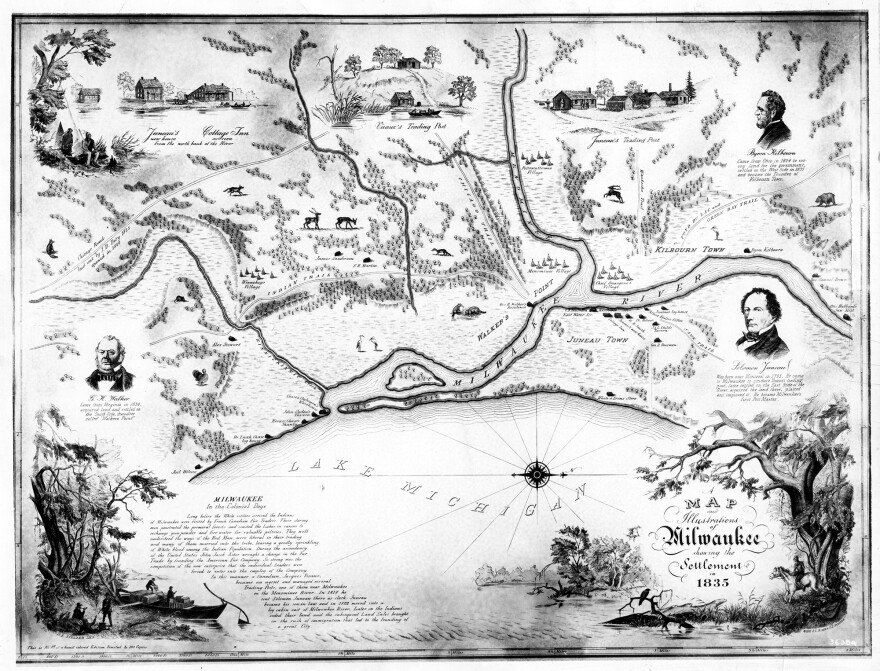When you look at a map of Wisconsin, it’s covered in names that remind us of this country’s original inhabitants. Milwaukee, Wauwatosa, Waukesha, Kinnickinnic — all words derived from Native American languages.
Another is Oconomowoc, about 30 miles west of Milwaukee. This week’s Bubbler Talk questioner, Jeff Dittel, moved there about two and a half years ago.
“[It’s] lake country,” he says. “There’s a couple dozen lakes. And some of them have English names like Pine Lake, Beaver Lake and whatnot. But some of them have really unique Native American names.”
Jeff says he has wondered for a while what those lake names — Oconomowoc, Nagawicka and Okauchee — mean.
For the answers, WUWM's Emily Files turns to Margaret Noodin and Michael Zimmerman.

Margaret is a descendent of the Lake Superior Chippewa and the director of the Electa Quinney Institute at UW-Milwaukee. Michael is a member of the Pokagon band of Potawatomi and a teacher at the Indian Community School in Franklin.
They both speak Anishinaabemowin – an umbrella term for closely-connected Potawatomi, Ojibwe and Odawa languages.
“We have Ho-chunk, Potawatomi and Menominee as the primary stewards of the space that we’re in now,” Margaret explains. “But the Mohicans, the Oneida, other folks moved in later.”

She says many of the place names in this area can be traced to Ojibwe words. Those names, Margaret explains, stuck because the Ojibwe tribes were heavily involved in mapping and trade with settlers beginning in the 1600s.
However, she adds, other tribes may have different definitions for certain names.
As for the words our Bubbler Talk questioner is curious about, Michael says that Oconomowoc likely comes from the Ojibwe word that means ‘they are building dams,' referring to beavers.
“Okauchee, you find that in Potawatomi and Ojibwe,” he says. “Okauchee means ‘it is small.’ So it’s talking about something being very small out there. And the other word - Nagawicka, Nagaway is ‘sand.’ Nagawicka is ‘a lot of sand.’”
Question asker Jeff is most suprised by the meaning of Okauchee: “I live right across the street from Okauchee Lake and out of all the lakes out here, it’s one of the bigger ones. And for me to find out that it means small … I wonder what they were referring to.”
And that’s the question for many Native American place names. The literal meaning is one thing, the story behind it is another.
“I think it’s interesting because you really can’t tell whether it’s a story they’re trying to tell, an incident that happened there, a person that might have had that name, or if that’s how they describe that place,” Margaret explains. “It’s very hard to know what it might have been for certain.”
This discussion, she says, reminds her of a quote from a Potawatomi author named Simon Pokagon. He wrote in the book 'Queen of the Woods', published in 1899:
"It is indeed mortifying for me to consider that outside of the proper names of lakes, streams and places, our language is being almost entirely ignored by the incoming race."
Native languages weren’t just ignored, but actively repressed and even considered a crime by the white authorities that governed their land.
“Many generations of adults would not want their children to be put in the position of being threatened by speaking this language,” Margaret says.
Both Margaret and Michael did not learn Anishinaabemowin growing up. They had to seek it out themselves as adults.
Now, they both teach indigenous languages. Margaret to college students and Michael to elementary classes. Their students will know Anishinaabemowin beyond the names of streets, cities and lakes.

A Look At More Wisconsin Place Names
Margaret Noodin and Michael Zimmerman share the meanings and stories behind the names a handful of additional Wisconsin places:
Milwaukee: Mino-akking 'good land' or Mahn-a-waukke 'gathering place'
LISTEN: Mino-akking, Mahn-a-waukke: What's the Origin of the Word 'Milwaukee'?
Mequon: Could mean ‘spoon’ in reference to the Milwaukee River bending to look like a spoon or it could be named after the daughter of a Native American chief who was named ‘Wau-Meegwun,’ which means ‘white feather’
Wauwatosa: ‘Firefly’ or literally ‘flashing of the rear end,’ referring to fireflies
Waukesha: ‘Fox’
Pewaukee: ‘Aukee’ means ‘earth,’ but Michael says it’s not clear what the other part of the word is referring to; could be derived from the term for ‘watery earth’
Menomonee: ‘Men of the wild rice’
Kinnickinnic: ‘To mix something up’
Have a question you'd like WUWM to answer? Submit your query below.
_






